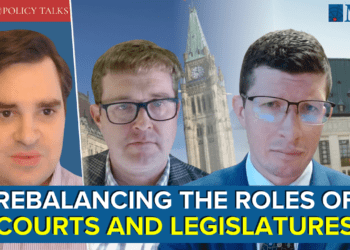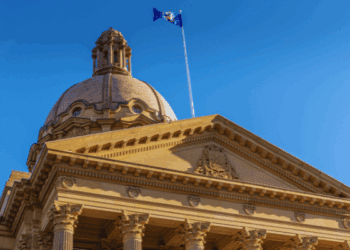This article originally appeared in The Hub.
By Trevor Tombe, July 24, 2025
Identity, culture, or historical grievances drive many independence movements around the world. Quebec’s sovereignty movement, for instance, centres on language and cultural differences with the rest of Canada.
But Alberta’s separatist impulse is different—it’s almost entirely about money.
Survey research by University of Alberta political scientist Jared Wesley and colleagues shows that among the roughly one-fifth to one-third of Albertans who, depending on the year, support the idea of separation, the vast majority cite economic and tax-related reasons. And a striking 88 percent cite a desire to “exit the equalization system.”
When the argument for separation leans so heavily on economics—as it often does in Alberta—it’s worth examining the claims more closely.
A recent report from the Alberta Prosperity Project, the group leading the referendum effort for Alberta to separate, offers a perfect test case. The report promises a lot from independence: an oil production boom reaching nearly 10 million barrels per day within two decades, a “New Alberta Dollar” backed by gold, oil, and Bitcoin, and government budget surpluses of between $23.6 and $45.5 billion. With such windfalls, they argue, an independent Alberta could eliminate personal and corporate income taxes, as well as the GST, entirely.
But the reality is far more complicated—and far less promising. The Alberta Prosperity Project numbers simply don’t add up.
Fiscal fantasy
Let’s start with taxes. Scrapping income and sales taxes would cut nearly $80 billion from government revenues—that’s the combined current federal and provincial take from these sources. This amount represents over half of what the Prosperity Project assumes the new country would collect in total revenues. You can’t eliminate more than half your income and still balance the books. Indeed, the lost revenue from eliminating these taxes is worth roughly twice as much as the Prosperity Project assumes Alberta’s surplus would be.
The expenditure side fares no better. The report casually eliminates Old Age Security and the Canada Child Benefit entirely, creating a roughly $10 billion spending gap with no explanation of what replaces these programs for Albertans.
Defence spending reveals another fantasy: while the report estimates Alberta national defence would cost a modest $3 to $5 billion, meeting NATO’s 2 percent of GDP target would require $10 billion initially, rising to $25 billion under the alliance’s new 5 percent target.
Perhaps most questionable, the fiscal projections appear to treat investment income from a separate Alberta Pension Plan as government revenue available to cover general expenses. Currently, the Canada Pension Plan is completely segmented and isolated from any government’s budget, ensuring returns are used only to sustain future benefit payments and keep contribution rates down.
It is true that the federal government raises more in revenues from Alberta-based taxpayers than it spends in the province on programs. In 2023, the gap was roughly $14.5 billion. But an independent Alberta’s finances would be anything but secure.
And that’s just the fiscal side.
The economic consequences of separation would likely be even more damaging.
The economic reality
History offers sobering lessons. Decades ago, Quebec also contributed more to federal coffers than it received in return, much like Alberta does today. However, as separatism gained momentum, uncertainty drove businesses to relocate their operations to Ontario. Quebec transitioned from a “net contributor” to a “net recipient” province by the early 1970s and hasn’t improved since.
So what would separation mean for Alberta’s economy?
It’s difficult to say with certainty, but at the very least, productivity would almost certainly decline as trade between Alberta and the rest of the country became more cumbersome—much as trade between the United Kingdom and the European Union became more challenging following Brexit.
Recent research suggests Brexit may have increased non-tariff barriers for the U.K. by 3 to 8 percent. This cut trade volumes significantly and shrank its long-run productivity by roughly 4 percent. Estimates show that the U.K.’s overall economy also shrank by perhaps 2-3 percent, on the low end, to as much as 5 percent.
Alberta would fare no better. My own estimates indicate that a 5 percent increase in the cost of importing to or exporting from Alberta would shrink the province’s economy by roughly 4 percent. For an economy expected to reach $500 billion next year, that 4 percent represents about $20 billion in foregone economic activity and income for Albertans—roughly $3,900 per person, or more than two months of rent. And at the higher end, with an 8 percent non-tariff barrier, Alberta’s economy would be 6 percent (or $30 billion) smaller.
The rest of Canada would also suffer if Alberta left, but far less. British Columbia would be especially hard hit, with its economy shrinking by more than 1.1 percent, while Saskatchewan, Manitoba, and Ontario would each see their economies contract by roughly 0.7 percent.
With a smaller economy, the province’s population and employment would inevitably decline. My model estimates roughly 8 percent of Alberta’s population—about 400,000 people—would leave seeking opportunities elsewhere. This number may actually be an underestimate, since the model reflects only normal migration patterns responding to economic conditions. It doesn’t capture the broader uncertainties and disruptions that separation would unleash.
It also fails to account for the potentially significant oil export costs that a newly independent Alberta would face. With most key export pipelines going through Canada (B.C. to the west and Saskatchewan to the east), one could easily imagine a special toll levied on such shipments to extract as much value as possible, leaving less for Alberta producers and the government.
The fiscal implications of all this compound the problem. A smaller economy would mean billions in lower government revenues. And with many businesses relocating their headquarters from Calgary to elsewhere, they would take their corporate income tax payments with them.
The bottom line
Of course, for some, separation reflects deeper anxieties about rapid economic and social change or frustration with a federal government considered unresponsive to provincial concerns. And while non-economic factors matter too, the most prominent separatist proposals in Alberta rest primarily on promises of prosperity.
But the fiscal and economic claims at the heart of such proposals are simply false.
A separate Alberta would be a poorer Alberta.
Trevor Tombe is a professor of economics at the University of Calgary, the Director of Fiscal and Economic Policy at The School of Public Policy, a Senior Fellow at the Macdonald-Laurier Institute, and a Fellow at the Public Policy Forum.






